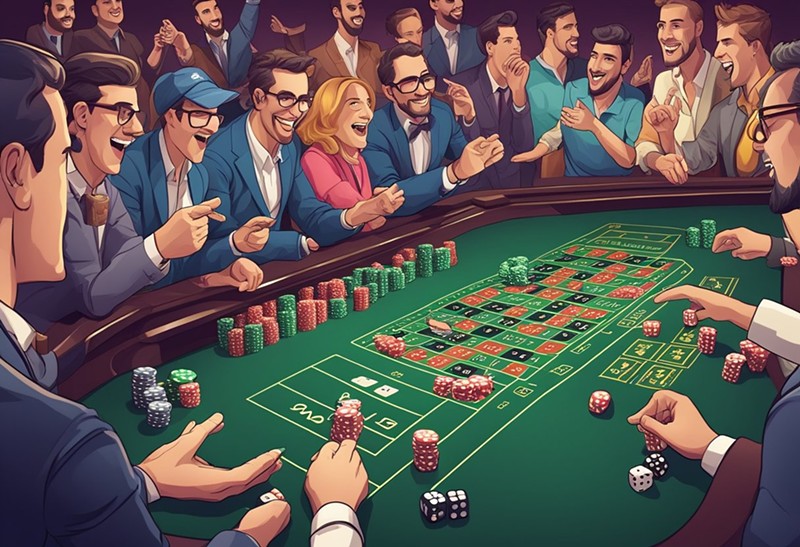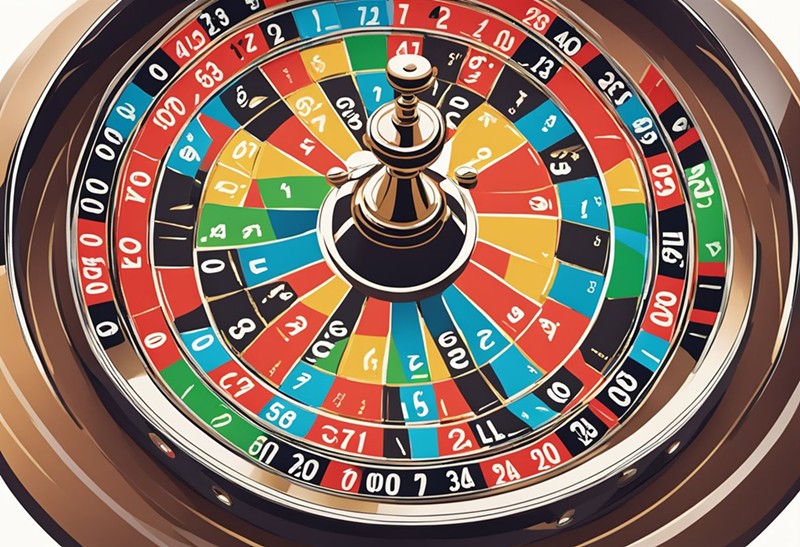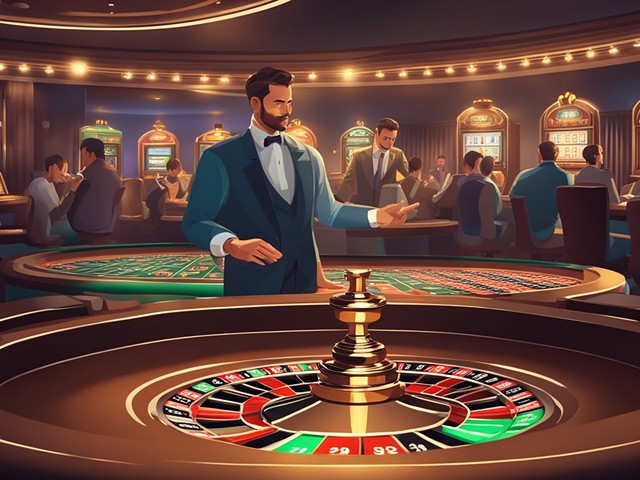When one enters the vibrant atmosphere of a casino, they are often faced with an array of games, each with its own set of odds and potential payouts. Understanding these odds is crucial for any gambler looking to maximize their chances of winning. The odds describe the likelihood of a particular outcome and are usually presented as a ratio or percentage. In contrast, the payout refers to the amount of money the player can expect to receive if they win.
Casino games vary widely in their odds, and thus their potential for profit. Some games offer better chances of winning and are known for their favorable odds.
- Blackjack, for example, is renowned for having one of the best odds for players. By using basic strategy, players can reduce the house edge to as low as 0.5%.
- Baccarat is another game with good odds, usually around a 1.06% to 1.24% house edge.
- Craps can also be a wise choice, with certain bets (like the 'Don't Pass' line) having a house edge as low as 1.36%.
- Roulette varies with the type, European having a single zero has a house edge of 2.70%, while American roulette, with a double zero, carries a higher edge.
Each game’s Return to Player (RTP) percentage signifies the theoretical return over many game sessions.
It is essential to remember that, while some games have better odds and RTPs, each outcome is ultimately dictated by chance. They have constructed casinos such that they always have an advantage, known as the house edge. This means that while players can have winning sessions, over time, the casino is statistically likely to retain a percentage of the total money wagered. Hence, gamblers should approach casino games as entertainment rather than a guaranteed way to make a profit.
Understanding the House Edge
The house edge is a critical factor in the world of casinos, influencing a player's potential return from a game. Here's a breakdown to help readers identify games with the best odds by understanding this concept.
House Edge Explained
The house edge represents the mathematical advantage that a casino has in any given game. It is expressed as a percentage indicating the casino’s expected return over the long term. For example, a game with a house edge of 1% suggests that for every $100 wagered, the casino expects to retain $1 as profit, on average. This edge is built into every game and varies across different types of games.
- Blackjack: Typically offers the lowest house edge, often as low as 0.28%, with player-friendly rules applied.
- Baccarat: Exhibits a house edge of around 1.06% when betting on the banker, making it one of the best choices for players.
- Craps: Can have a low house edge on certain bets, with the 'Don't Pass' bet carrying an edge of roughly 1.36%.
The house edge is affected by several factors, including game rules and player skill. For instance, European Roulette is favored over its American counterpart due to a single zero, resulting in a lower house edge of 2.70% as opposed to 5.26% for double zero roulette.
Role of House Edge in Game Selection
The role of the house edge (HE) is paramount in game selection. Players who understand HE can make informed decisions and gravitate towards games that offer the best chances of winning. They tend to seek out games with a low HE because these games potentially reduce the casino's advantage over time.
- Game Strategy: Games like blackjack can have a reduced HE with the application of optimal strategies.
- Type of Bet: In games like craps, different types of bets have varying HEs.
- Game Version: The choice between American and European Roulette greatly affects the HE due to the number of zeroes on the wheel.
The Art of Blackjack
Blackjack stands as one of the casino games with the most favorable odds for players, combining skill with chance. Mastering blackjack strategy and understanding the influence of house rules are critical for enhancing winning opportunities.
Basic Blackjack Strategy
To optimize their chances of winning, players should adhere to a basic blackjack strategy, which prescribes the best move (hit, stand, double down, split, or surrender) depending on the player's hand and the dealer's visible card. Basic strategy can reduce the house edge significantly, often to less than 1%. Blackjack payouts also influence strategy decisions, particularly in differentiating whether a game pays 3:2 or 6:5 for a natural blackjack (an ace with a 10, Jack, Queen, or King).
A basic strategy table for a standard multi-deck blackjack game might look as follows:
| Your Hand | Dealer's Upcard | Action |
|---|---|---|
| 12-16 | 2-6 | Stand |
| 12-16 | 7-Ace | Hit |
| 17+ | Any | Stand |
| A,8-A,10 | Any | Stand |
| A,2-A,7 | 2-6 | Double Down |
| A,2-A,7 | 7-Ace | Hit |
Players should memorize the actions in the table to improve gameplay and bet sizing more effectively.
Card Counting and House Rules
While card counting is a strategy element not endorsed by casinos, it can be a powerful tool in the hands of skilled players, allowing them to anticipate the likelihood of high cards being dealt. Card counting assigns a value to high cards and low cards as they are seen, then adjusts the bet size based on the running count; higher counts suggest a greater likelihood of a natural blackjack and better odds for the player. However, players should be aware that casinos may prohibit card counting and can employ countermeasures such as using multiple decks or reshuffling the deck earlier.
House rules vary by casino and can impact the house edge considerably. Rules such as dealers hitting or standing on a soft 17, the ability to surrender, and the number of decks used alter the strategy and player odds. Players must tailor their approach to these rules to maintain the best possible advantage. For instance, a single-deck game where the dealer stands on soft 17 and blackjack pays 3:2 offers a house edge as low as 0.13%, making it one of the best blackjack games for the player.
Craps and Dice Dynamics
Craps is a casino table game renowned for its variety of bets and the role dice probabilities play in determining outcomes. Strategy and understanding of the game's mechanics can influence player decisions.
Craps Table Bets
Each craps table lays out an array of betting options for players, the most fundamental of which are the pass line and don’t pass bets.
- Pass Line Bet: A bet predicting that the shooter (the person rolling the dice) will roll a 7 or 11 on the come-out roll or successfully roll the point number again before a 7 is rolled.
- Don’t Pass Bet: This bet is essentially the opposite of the pass line bet; it wins if the come-out roll is 2 or 3, pushes on 12, and loses on 7 or 11. If the point is established, the bet wins if a 7 is rolled before the point.
Players can approach the craps table with a strategy involving multiple bet types such as "Come" and "Don't Come" bets, odds bets, and propositions. However, pass line and don't pass bets are typically where most will start due to their simplicity and relatively more favorable odds.
Theoretical Probabilities in Craps
Craps relies heavily on the probabilities associated with rolling two six-sided dice. There are 36 possible combinations, and the natural outcomes form the foundation of craps probabilities.
Here is a look at the basic probabilities of rolling each total in craps:
| Dice Total | Number of Combinations | Theoretical Probability |
|---|---|---|
| 2 | 1 | 2.78% |
| 3 | 2 | 5.56% |
| 4 | 3 | 8.33% |
| 5 | 4 | 11.11% |
| 6 | 5 | 13.89% |
| 7 | 6 | 16.67% |
| 8 | 5 | 13.89% |
| 9 | 4 | 11.11% |
| 10 | 3 | 8.33% |
| 11 | 2 | 5.56% |
| 12 | 1 | 2.78% |
These percentages are crucial as they determine the "true odds" in craps, which are different from the payout odds the casino offers. For example, the true odds of rolling a 7 are 6 out of 36 because there are six combinations that can yield a 7. This results in a true odds calculation of 5 to 1.
Understanding these probabilities helps players assess which bets might be more advantageous. The house edge varies for different bets, with the pass line bet typically being among the most favorable for the player due to its low house advantage, as compared to other wagers with higher house edges.
Roulette Variants and Odds
Roulette is a quintessential casino game with various variants, each offering different odds to players. The most common versions are American and European Roulette, which differ in wheel layout and house edge implications. Payouts and probabilities shift significantly between these types, affecting the risk-reward balance of the bets placed.
American versus European Roulette
American Roulette features a wheel with 38 numbers, including 0, 00, and 1 through 36. The addition of the double zero (00) increases the house edge to 5.26%. In contrast, European Roulette consists of 37 numbers, with a single 0 and the numbers 1 through 36. The lack of a double zero in European Roulette reduces the house edge to 2.7%, making it more favorable:
| Roulette Type | Total Number Slots | House Edge |
|---|---|---|
| American | 38 | 5.26% |
| European | 37 | 2.7% |
Certain bets, like betting on green (which includes the 0 and 00 in American Roulette), pay differently depending on the variant, altering the betting strategy.
Risks and Returns in Roulette Betting
The betting odds in roulette are straightforward, with payouts corresponding to the risks. A bet on a single number, or a straight-up bet, pays 35:1 with a probability of 2.63% in American Roulette and 2.70% in European Roulette. More complex bets, like a basket bet in American Roulette—which covers the numbers 0, 00, 1, 2, and 3—come with a 6:1 payout and a 13.16% chance of winning.
European Roulette may also offer rules like "La Partage" and "En Prison," which can half the losses on even-odds bets if the ball lands on zero. These rules further lower the house edge on even-odds bets:
| Bet Type | European Roulette Payout | American Roulette Payout | Probability of Winning European | Probability of Winning American |
|---|---|---|---|---|
| Straight-up (single number) | 35:1 | 35:1 | 2.70% | 2.63% |
| Basket (0, 00, 1, 2, 3) | Not applicable | 6:1 | Not applicable | 13.16% |
Bets in roulette cover a wide range of probabilities, from near 50% for red/black or odd/even to less than 3% for a single number. As the risk of the bet increases, so does the potential return, but the probability of winning decreases accordingly. Players need to weigh these factors when choosing their betting strategy at the roulette table.
Slots and Their Allure
Slot machines captivate players with their simplicity and the potential for large payouts. Understanding their mechanics and the reality of their jackpots sheds light on why they remain a casino staple.
Slot Machine Mechanics
Slot machines operate using a combination of random number generators (RNGs) and paytables. RNGs ensure each spin is independent and unpredictable, contributing to the game's volatility. The paytable provides information on the values of different symbol combinations and special features unique to each game. For instance, Starmania offers a high RTP (return to player) of over 97%, making it one of the more appealing options for players looking for games with better odds.
Progressive Jackpots and Their Odds
Progressive jackpots are cumulative prizes that grow with every bet placed until a lucky player hits the winning combination. The odds of winning such jackpots are generally slim, often comparable to the likelihood of winning a lottery. However, they can offer life-changing sums. For example, a typical payout from a progressive slot such as Mega Joker can span from a few thousand to millions of dollars, depending on how long the jackpot has accumulated and the number of participating players contributing to the prize pool.
Video Poker: A Blend of Skill and Luck
Video poker represents a unique intersection in casino gaming where a player's decisions directly influence the outcome. It strikes a balance between chance and strategy, with the potential for favorable odds when played correctly.
Optimal Video Poker Strategies
To capitalize on video poker's odds, players must understand and employ optimal strategy. This involves knowing which cards to hold and which to discard in every possible hand situation. Strategies can vary slightly among different video poker games, but the cornerstone of most strategies is aiming for the best potential paying hand. For instance, in Jacks or Better, the most fundamental strategy is to retain all cards that are a pair of jacks or higher and to discard lower-value cards unless they are part of a four-card straight, flush, or royal flush.
| Hand | Strategy |
|---|---|
| Royal Flush Draw | Keep all the cards aiming for the jackpot. |
| Four of a kind or better | Keep the winning hand. |
| Four-Card Flush | Keep the four flush cards and draw one. |
| Low Pair | Keep the pair and draw three new cards. |
Paying Hands and Paytables
The paytables in video poker delineate the payouts for all possible winning hands and are pivotal in determining the best odds in the game. A full-pay 9/6 Jacks or Better table, for instance, offers a payout of 9 coins for a full house and 6 coins for a flush, per coin bet. This results in a theoretical return to player (RTP) of 99.54%, assuming optimal strategy. The coveted royal flush generally offers the highest payout, often set at 800 to 1.
| Hand | 9/6 Payout |
|---|---|
| Royal Flush | 800 |
| Straight Flush | 50 |
| Four of a Kind | 25 |
| Full House | 9 |
| Flush | 6 |
| Straight | 4 |
| Three of a Kind | 3 |
| Two Pair | 2 |
| Jacks or Better | 1 |
The precise makeup of paytables varies across different games and establishments, but a discerning player will always seek out the most favorable paytables, like the Double Bonus Poker variant, which can offer a slight edge over the house with paybacks exceeding 100% for those adhering to expert strategy.
Baccarat: Simplifying the Odds
In Baccarat, understanding the odds is central to strategizing effectively. The house edge, payouts, and the implications of betting options create the framework for wise decision-making at the table.
Betting Options in Baccarat
In Baccarat, players face three primary betting options: the Banker's hand, the Player's hand, or a Tie. The Banker's hand offers a 45.86% probability of winning and typically features the lowest house edge, making it the most favorable of the betting options. The Player's hand is not far behind, with slightly lower odds at 44.62%, and like the Banker's bet, it pays 1:1.
- Banker's Bet: 45.86% chance to win, pays 1:1.
- Player's Bet: 44.62% chance to win, pays 1:1.
However, casinos typically take a commission—commonly 5%—on Banker bets, slightly reducing the payout. Despite the commission, the Banker's bet is often recommended due to the combination of high winning odds and a relatively small house edge.
Understanding the 'Tie' Bet and Commission
The 'Tie' bet comes with enticing payout odds but is less likely to occur, with about a 9.52% chance. Although it promises a higher payout of 8:1, the house edge on a Tie is significantly higher than both the Banker and the Player bets, which diminishes its value as a strategic wager.
- Tie Bet: 9.52% chance to win, pays 8:1.
Regarding the Banker's bet, the standard 5% commission on winnings affects the actual payout, reducing the net gain for successful bets. This commission is the casino's way of maintaining its edge even on the most player-favorable bet.
- Commission on Banker's Bet: Standard rate of 5%.
Thus, while the Tie bet may seem lucrative, the Banker and Player bets typically offer better odds and a more effective allocation of a player's bankroll. The Banker's winning odds slightly surpass 50% when disregarding the Tie bet option due to the inherent rules of Baccarat.
Other Notable Table Games
Table games in casinos offer a range of odds and player experiences, with certain games providing players with better opportunities to apply strategies that can influence their chances of winning. Among these, poker varieties and Pai Gow Poker stand out for their blend of skill and luck.
Poker Varieties and Winning Chances
Poker encompasses a spectrum of games each with variations in rules and winning chances. Texas Hold'em and Omaha are commonly found in casinos, where players bet in several rounds, employing strategies to maximize their odds of winning. These games offer competitive odds as they are not just based on luck but also on a player's skill and ability to bluff or make strategic decisions. Payout rates in poker can significantly vary, as winnings are contingent upon the pot amassed from player bets rather than fixed casino payouts.
- Texas Hold'em: A community card game with emphasis on strategic betting.
- Omaha: Similar to Texas Hold'em but with four hole cards, increasing the complexity.
Pai Gow Poker: A Strategic Approach
Pai Gow Poker presents a unique blend of traditional poker and an ancient Chinese tile game. Players must create two separate hands—a five-card hand and a two-card hand—from their seven dealt cards. The five-card hand must be higher in value than the two-card hand. Success in Pai Gow requires a balance of knowledge and strategy, as players must determine the optimal division of their cards.
Payouts in Pai Gow Poker:
- Five-card hand victory: Often pays even money, minus a small commission for the house.
- Two-card hand victory: Also usually even, making the game a low-risk choice.
Betting options in Pai Gow Poker are typically straightforward, emphasizing a player's card splitting skill over more complex bet varieties. As a result, this game often appeals to those who enjoy a more measured, strategic gaming experience.
Accelerating Your Edge with Game Strategies
In the realm of casino gaming, players can leverage strategic and mathematical approaches to enhance their odds of winning. By understanding the underlying probabilities and adopting specific strategies, they can tilt the games’ outcomes slightly in their favor.
Mathematical Approaches to Casino Games
Casino game outcomes are largely governed by statistical probabilities. To gain an edge, players must harness mathematical strategies that align with these probabilities. For instance:
- Blackjack: Applying basic playing strategy can reduce the house edge to as low as 0.5%.
- Craps: Placing bets such as 'Don't Pass' lines can correspond with a lower house advantage.
Players should seek out games with a statistical advantage, understanding that their skill level influences the effectiveness of these mathematical strategies.
Strategic Play for Long-Term Wins
Long-term success in casino games is not assured, but players can improve their chances through sustained strategic play. The following are key components to consider:
- Skill Development: Regular gameplay and study can sharpen a player's proficiency, impacting games like poker where skill plays a pivotal role.
- Probabilities Awareness: Knowledge of game odds and payout structures aids in strategic bet placement.
Players who commit to a disciplined playing strategy, one that's aligned with mathematical insights, are more likely to experience favorable outcomes over time. They must continuously adapt their strategies to their evolving skill level and the variances of each casino game.
Managing the Casino Gaming Experience
In crafting an enjoyable casino gaming experience, players must prioritize strong financial tactics and recognize the intrinsic value of the games they choose to play.
Effective Bankroll Management
A player's bankroll is their lifeblood within the casino environment, necessitating a thoughtful and structured approach to sustain their participation in the games. Bankroll management involves setting a budget based strictly on funds allocated for gaming, thereby mitigating the risk of significant financial loss.
- Set a limit: Before engaging with any casino games, it is crucial to establish a clear budget that defines the amount one is willing to stake. This limit should never compromise a player’s financial stability.
- Stick to the budget: Adhering strictly to the predetermined budget ensures that gaming remains an entertainment activity and does not negatively impact a player's financial wellbeing.
Effective management of one’s bankroll can extend play time and enhance the overall gaming experience. It also helps to mitigate the potential of chasing losses, which can lead to higher risk and financial strain.
Understanding Gaming Entertainment Value
Each game within a casino—from Las Vegas glamour to online casino offerings—provides a distinct entertainment value, compounded by the prospects of financial return. Players must comprehend the entertainment value of a game, assessed by its fun factor and the level of engagement it provides, against the backdrop of its inherent house edge.
- House Edge Interpretation: Understanding the average gross gaming revenue for games provides insight into their potential value. For example, blackjack, with a lower house edge, offers better odds for the player, thus increasing the entertainment value due to prolonged play and increased opportunities to win.
- Entertainment vs. Risk: A prime consideration in game selection should be the balance between the entertainment value derived and the level of risk involved. Higher odds can mean higher risks, but also the chance for a greater payout. Conversely, simple games with lower payout rates, like slot machines, may offer less risk but also a lower chance of significant rewards.
By closely examining these factors, players can maximize their entertainment value while staying within their financial limits, ensuring a balanced and enjoyable casino gaming experience.
Significant Factors in Game Selection
Selecting the right casino game can significantly impact a player's chances of winning. Payout rates, game volatility, and the Return to Player (RTP) are crucial metrics that should guide players' decisions.
Game Volatility and Return to Player
Game Volatility refers to how often a game pays out and the size of its payouts. High volatility games pay out less frequently but offer larger prizes, while low volatility games pay out more often but with smaller amounts. The RTP is a percentage that indicates the expected return on money wagered over time. Players should seek games with higher RTPs for better long-term potential, such as Blackjack, which typically offers an RTP upwards of 92%.
Casino Game Payout Comparisons
When comparing casino game payouts, players should consider two factors:
- House Edge: The average profit the casino expects to make from each game. A lower house edge means better odds for the player. Blackjack, for example, sits around a 0.5% house edge.
- Payout Rates: The actual winnings a game pays out. Games like Slots can vary widely, with some providing payout rates between 80% to 95%.
A comparison table for two popular games:
| Game | RTP | House Edge | Volatility |
|---|---|---|---|
| Blackjack | ~92% | 0.5% | Low |
| Slots | 80-95% | Varies | High |
Frequently Asked Questions
This section provides clear and concise answers to common questions about the odds of various casino games, helping you to understand which games may improve your chances of winning.
Which table game offers the highest chances of winning?
Blackjack offers the highest chances of winning among table games, with house edges as low as 0.13% to 1%. The player competes directly against the dealer, which simplifies the game dynamics and enhances winning odds.
What slot machines have the highest payout percentage?
Slot machines with high payout percentages are known as "loose slots." They tend to have a payout percentage ranging from 95% to 99%. These machines offer better chances for payouts compared to others with lower payout percentages.
Are there any casino games to play online that offer favorable odds to the player?
Online casino games such as Blackjack, Deuces Wild, and Jacks or Better video poker offer favorable odds to players. Deuces Wild versions can have an expected return of up to 99.72%.
In terms of odds, what is the best casino game to win money?
Blackjack is generally considered the best casino game to win money due to its low house edge and the player's ability to influence the game's outcome through strategic decisions.
How do casino game odds affect your winnings over the long term?
The odds of a casino game directly affect a player's potential for long-term winnings. Games with a lower house edge usually result in less loss over time, thereby offering a greater chance for profit in the long run.
Which casino games have historically provided the best payouts to players?
Historically, games with the potential for high payouts to players include Blackjack and certain versions of video poker. Blackjack, in particular, is known for its favorable odds and has consistently provided some of the best payouts.









